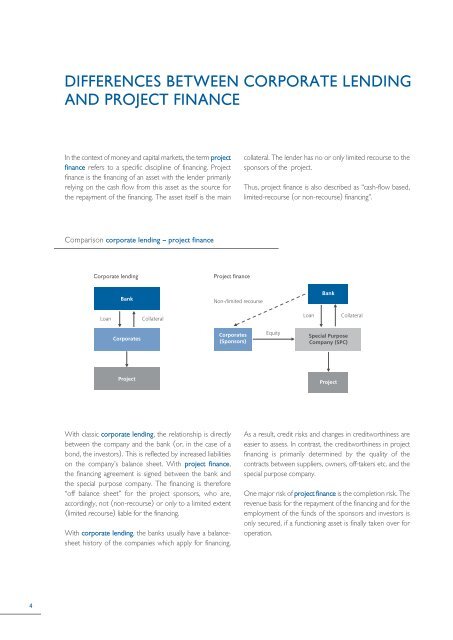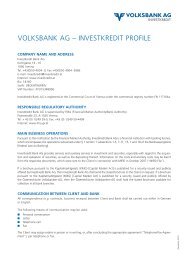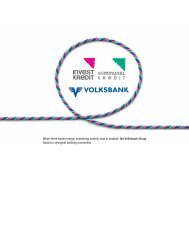Download - Volksbank AG
Download - Volksbank AG
Download - Volksbank AG
Create successful ePaper yourself
Turn your PDF publications into a flip-book with our unique Google optimized e-Paper software.
DIFFERENCES BETWEEN CORPORATE LENDING<br />
AND PROJECT FINANCE<br />
In the context of money and capital markets, the term project<br />
finance refers to a specific discipline of financing. Project<br />
finance is the financing of an asset with the lender primarily<br />
relying on the cash flow from this asset as the source for<br />
the repayment of the financing. The asset itself is the main<br />
collateral. The lender has no or only limited recourse to the<br />
sponsors of the project.<br />
Thus, project finance is also described as “cash-flow based,<br />
limited-recourse (or non-recourse) financing”.<br />
Comparison corporate lending – project finance<br />
Corporate lending<br />
Project finance<br />
Bank<br />
Non-/limited recourse<br />
Bank<br />
Loan<br />
Collateral<br />
Loan<br />
Collateral<br />
Corporates<br />
Corporates<br />
(Sponsors)<br />
Equity<br />
Special Purpose<br />
Company (SPC)<br />
Project<br />
Project<br />
With classic corporate lending, the relationship is directly<br />
between the company and the bank (or, in the case of a<br />
bond, the investors). This is reflected by increased liabilities<br />
on the company’s balance sheet. With project finance,<br />
the financing agreement is signed between the bank and<br />
the special purpose company. The financing is therefore<br />
“off balance sheet” for the project sponsors, who are,<br />
accordingly, not (non-recourse) or only to a limited extent<br />
(limited recourse) liable for the financing.<br />
With corporate lending, the banks usually have a balancesheet<br />
history of the companies which apply for financing.<br />
As a result, credit risks and changes in creditworthiness are<br />
easier to assess. In contrast, the creditworthiness in project<br />
financing is primarily determined by the quality of the<br />
contracts between suppliers, owners, off-takers etc. and the<br />
special purpose company.<br />
One major risk of project finance is the completion risk. The<br />
revenue basis for the repayment of the financing and for the<br />
employment of the funds of the sponsors and investors is<br />
only secured, if a functioning asset is finally taken over for<br />
operation.<br />
4









